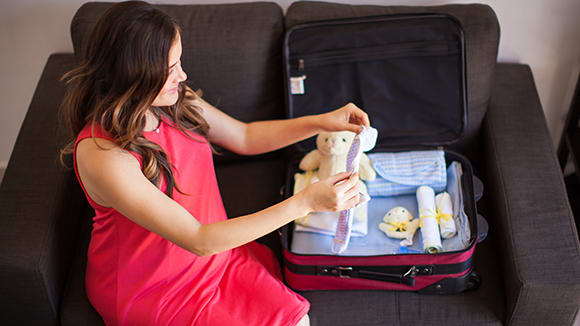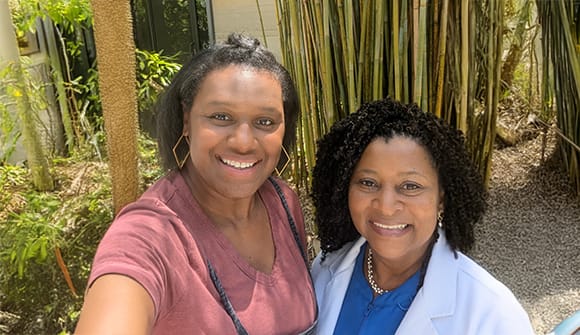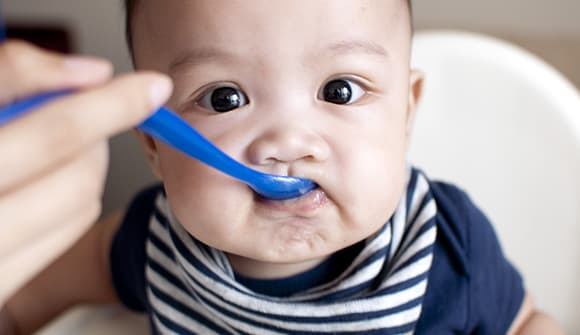‘I think I have postpartum anxiety and depression’
New program shines spotlight on maternal mental health.
Article Author: Juliette Allen
Article Date:

Every detail was perfectly planned down to the handmade party hats on the heads of tiny toy animals. Heather Bernstein spent hours ensuring her son Grayson’s “party animal” first birthday party went off without a hitch, and it did. But soon after, unwanted familiar feelings started to creep back in.
“I didn’t have an outlet to focus my attention anymore, so I started to feel anxious and low again,” she remembered. “It started to really rear its ugly head. And that’s about the time I reached out to Baptist Behavioral Health.”
From premature labor to postpartum struggles
Bernstein’s first days of motherhood didn’t go as she had planned. She went into labor at 34 weeks, and despite efforts by doctors to stop it, Grayson was born three days later at Baptist Medical Center Jacksonville. The newborn was immediately whisked away to Wolfson Children’s Hospital’s Neonatal Intensive Care Unit (NICU), where he spent the next two weeks.
As Bernstein navigated breastfeeding, sleepless nights and all things new motherhood, she had lingering concerns for her premature baby’s health. Though she recognized that she had experienced “mom rage” and felt overwhelmed, it wasn’t until after Grayson’s birthday that she realized she may be suffering from a perinatal mood and anxiety disorder (PMAD).
Bernstein recalled the relief she felt during her first session with Julia “Jill” Garrett, PsyD, licensed psychologist and director of Baptist Health’s Maternal Mental Health program.
“I spent the first five minutes telling her everything we had been through and how I was feeling, and I said, ‘I think I have postpartum anxiety and depression.’ She just nodded and said, ‘I think that’s a very astute observation.’”
PMADs: More than postpartum depression
A perinatal mood and anxiety disorder is any emotional challenge that occurs during pregnancy or the year after delivery, explained Dr. Garrett. The overarching term includes depression, anxiety, post-traumatic stress disorder, panic disorder and more.
“PMADs are quite common,” she said. “As many as 1 in 5 moms, 1 in 10 dads, and 1 in 3 moms of color will experience a PMAD.”
Bernstein continued to see Dr. Garrett on a biweekly basis throughout her second pregnancy two years later, and felt empowered by having coping skills and resources before her daughter’s birth.
“I was able to have my close friends and family sign what we called a ‘postpartum pact.’ It was a list of things I wanted them to look for, and if they started to recognize those behaviors in me, it was important that we act on it,” she said.
Baby Violet was born healthy and full term, with Bernstein finally able to get the labor and delivery experience she’d imagined.
“It was very much the healing experience that I needed. I was able to actually pack a hospital bag and have the music I wanted, the aromatherapy, everything,” she remembered. “Just the ability to keep my baby in the room with me and bring her home the next day – whereas Grayson was immediately taken to the NICU – was amazing.”
A healing place in The Motherhood Space
A new program from Baptist Health is providing mental health support to new and expecting moms who are struggling with PMADs.
The Motherhood Space is an intensive outpatient program designed for anyone who is pregnant or has delivered in the past 18 months. With an emphasis on wellness, the day program was carefully designed to provide the care and resources mothers need most and address many of the barriers that could prevent them from seeking out support.
“We designed The Motherhood Space with moms in mind,” said Dr. Garrett. “The group programming is social and engaging, facilitated by psychologists who specialize in the perinatal period – and who happen to be moms, themselves! We have a private lactation space, a massage chair and relaxation area, transportation services for those in need, and scholarships for moms who use Medicaid.”
Day program participants attend sessions three days a week for up to three weeks and participate in a variety of activities including mommy-and-me yoga and walking therapy. Additionally, The Motherhood Space offers free educational videos to the public on topics including strategies for support, PMADs 101, baby blues, self-screening tips and more.
“I definitely would have loved something like The Motherhood Space, especially when Grayson was in the NICU,” Bernstein said. “If it had existed when I was pregnant or postpartum, the healing would have started much sooner.”
‘Know that you’re not alone’
With her children now 5 and 2, Bernstein continues to speak to her friends about perinatal mental health and encourage women to seek professional help when they need it.
“Always speak up. Always tell your closest friends or family what you’re thinking and how you’re feeling,” she said. “Don’t be afraid to ask for help and use the resources that are available.”
Dr. Garrett added, “Trust your gut and know that your insight is a strength. If you're not feeling well, know that you’re not alone. There are things you can do to feel better, and we’re here to help.”
If you’re a new or expecting mom who’s struggling with depression, anxiety or other mental health condition, The Motherhood Space may be a healing choice for you. To learn more, call 904.376.3800 (select option 4 for intensive outpatient program) or visit baptistjax.com/motherhoodspace. To browse the free video series on YouTube, click here.



